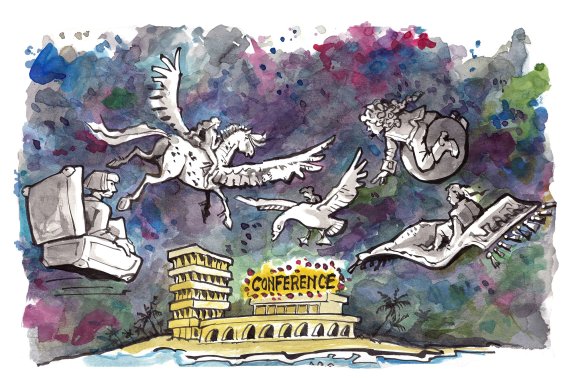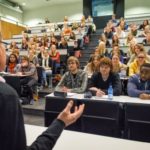WUR staff clock up a lot of air miles, and therefore contribute a lot to greenhouse gas emissions. That has got to change, says the Executive Board in the new Mobility Vision 2030. Staff must take the train more and use teleconferencing. The researchers Resource talked to agree wholeheartedly. But it is not easy.
Rik Leemans
Professor of Environmental Systems Analysis, one of the researchers who asked the Board recently in a ‘climate letter’ to do something about the many flights
‘One third of WUR’s carbon footprint is caused by flying. That really could be reduced. If you have to go to London, for instance, you’ll get from door to door just as fast by train. What is more, it’s easy to talk to people in the train and there is more space to work. But it is more expensive and since it comes out of the project budget, a project leader is likely to say: just take the plane. In the first years that I worked in Wageningen, I had platinum frequent flyer status with KLM; now I’ve just got silver, fortunately. I have become much more selective and I don’t go to as many international conferences. It’s different for young scientists; they still need to build up a network, so direct social contact at conferences is important. But for the old guard, who all know each other quite well, you could perhaps keep in touch in other ways, like video conferencing. I think WUR should take the lead in this and set clear rules, about taking the train to cities within Europe, for instance. The guidelines already say these trips should be done by train whenever possible, but people often don’t stick to that.’

Arjen Wals
Professor of Transformative Learning for Socio-ecological Sustainability
‘I fly too much and I suffer from flying shame. It doesn’t make my story any more credible; quite the opposite in fact. When I get asked to an event that means flying, I ask myself: is the ecological impact of what I will do or set in motion bigger than the ecological footprint I will create to get there? That’s not easy to answer. What is the positive impact, for instance, of a keynote speech to 600 people in Taiwan, about sustainability in education? I think that in any case, WUR should always compensate for CO2. You could put that money into a sustainability fund for the building where the flying staff member works. Students and staff, including cleaners, caretakers and support staff, can manage that fund. It could be used for things like putting solar panels on the roof or making a carpooling app. Make a project out of it that everyone’s involved in.’

Karin Schroen
Personal professor of Food Process Engineering
‘We scientists travel quite a bit. And it is required of us to some extent, because WUR wants us to be visible and have an impact. And I agree with that, but it does worry me too, because I know what kind of impact this has on the climate. You can do some things digitally. We are seeing that workshops are more often being conducted using Skype. If you have met each other before, and you’ve worked together regularly, you can do a lot digitally. But it is good for your network to have actually met people once, at least. I try to take the train for trips within Europe. I can work well, especially in the high-speed trains like the one to Paris. But there are also destinations for which the train journey is too time-consuming. Maybe WUR could promote train travel more. There are universities where they only cover the costs of a business trip if you take public transport.’

Christine Plaisier
International Policy researcher at Wageningen Economic Research
‘All the work of our team, Impact Evaluations, takes place overseas, in Asia, Africa and Latin America. I can’t do my work properly without flying. I am just rounding off a project in which we have been supervising local research from a distance. And one of our main conclusions about the process was that it didn’t work well. Media like Skype are certainly useful, but it is important to build up a relationship and mutual trust first. To get some kind of understanding of the people you are working with and the way they work, you need to really be there, especially if you’re working with a different culture. Of course, for every trip we ask ourselves what the aim is. And does it weigh up against the environmental costs? Do three of us really have to go or would one person be enough? We certainly discuss things like that.’

Hannah van Zanten
Research in the Animal Production Systems chair group
‘I could travel somewhere every month but I try and keep it to a minimum. Not just for environmental reasons, but also because I have a family. If a conference is held every year, for example, I skip the one in Thailand and go next year when it’s in Europe. It’s difficult for major discussions but we often discuss smaller issues by Skype, and then get together once a year to discuss the things it’s harder to deal with on Skype. We do that not just for environmental reasons but also because it’s a more efficient use of time. Personally I don’t feel that WUR actively encourages less flying; it’s coming more from people themselves. I try and take the train as often as possible, but sometimes the connections are bad and I would have to change trains in the middle of the night. Then I do fly, but it does bother me.’

 Illustratie: Henk van Ruitenbeek
Illustratie: Henk van Ruitenbeek 

